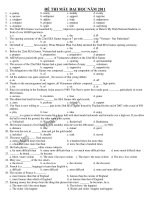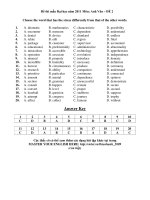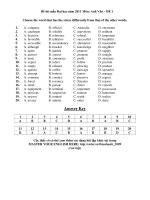BỘ ĐỀ THI THỬ ĐẠI HỌC NĂM 2011 - BỘ ĐỀ THỨ 13 - TRƯỜNG THPT TÂN HỒNG ppt
Bạn đang xem bản rút gọn của tài liệu. Xem và tải ngay bản đầy đủ của tài liệu tại đây (88.26 KB, 4 trang )
BỘ ĐỀ THỨ 13
SỞ GD&ĐT ĐỒNG THÁP
TRƯỜNG THPT TÂN HỒNG
I / PHONETICS:
A./ Choose the word whose underlined part has the pronunciation different from that of the
other words: (Chọn từ phần gạch chân có cách phát âm khác với những từ còn lại)
1. A.intention B.action C .question D.mention
2. A.waste B. water C. went D.answer.
3. A. tourists. B.crops C.laws D.cooks
.B./ Pick out the word stressed different from the rest(Nhặt từ có trọng âm khác với các từ
còn lại)
4. A. office B.garden C. prepare D.flower
5.A. function B. declare C.begin D. convince
II/ VOCABULARY& GRAMMAR: Choose the correct answer: (Chọn phần trả lời đúng)
6.Your bad result made me__________.
A. disappoint B. disappointed C. disappointing D. disappointedly
7. The _____ of waste paper and old newspapers help us to save a great amount ofwood pulp
A. recycling B. recyclable C. recycle D. to recycle
8. The area is roped off because the water is___________
A. restricted B. drained C. preserved D. contaminated
9. Even children who are _____ keen on particular occupation often know little about it.
A. suppose B. supposed C. supposedly D. supposingly
10. He lived in the countryside during his __________.
A. child B. childish C. childhood D. childless
11. The Norman_______ England in 1066.
A. conquered B. overcame C. invented D. discovered
12. I sometimes do not feel_______when I am at a party.
A. comfort B. comfortable C. comforter D. comfortably
13. Jack London wrote several________ novels on adventure.
A.interest B. interests C. interested D.interesting
14. He _______ a big house from his aunt.
A. offered B. gave C. lent D. inherited
15. I don’t have enough good words to______ her kindness.
A. talk B. describe C. draw D. say
16. You and I____ here with them everyweek.
A. am B. are C. was D. were
17. I’ve been to the theatre________times.
A. little B. a little C. few D. a few
18. She was confused________ the dates.
A. about B. with C. at D. from
19. That’s the house______ I used to live in.
A. which B. where C. why D. when
20. He was exhausted after he_____for ten hours yesterday.
A. has worked B. had worked C. was working D. worked
21. They have lived in America for a long time, so they are accustomed ______independent.
A.to be B. being C. to being D. be
22. Sounds are carried from the eardrum to the nerves of the ear______ we can hear.
A. because B. so that C. although D. unless
23.After you graduate from the university, you still have to go_______ studying
A. on B. along C. up D. off
24. By the time you_______ this book, your meal will get cold.
A. will read B. will have read C. have read D. are reading
25. He said that he_________ his homework since 7 o’clock.
A.did B. was doing C. had done D.has done
III/ WRITING:
A./Choose the underlined word or phrase in each sentence that needs correcting (Chọn từ
hoặc cụm từ được gạch dưới trong mỗi câu cần được sửa lỗi)
26.My shoes need to mend so I take them to the shoes-maker.
A B C D
27. Peter wishes they have not been punished by the teacher yesterday
A B C D
28. Mr Pike stopped his car, got out, and looking around
A B C D
29.One who live in a big city sometimes thinks that people who live in yhe country are
A B C D
illiterate and uncultured.
30.Gets the bad news from her parents, Mary immediately burst into tears
A B C D
B./ Choose an appropriate phrase or clause to complete the sentence (Chọn cụm từ hoặc
mệnh đề thích hợp để hoàn thành câu)
31. Shall we invite our friends on Sunday ? This means _____
A. Do you consider to invite our friends on Sunday?
B. Do you consider inviting our friends on Sunday?
C. Do you consider invite our friends on Sunday?
D. Do you consider invited our friends on Sunday?
32. Why are you working so late?_ Are you_________the time?
A. good at B. available for C. aware of D. confident of
33. “Why don’t you put your luggage under the seat?”,he asked me. This means _____
A. He suggested that I should put my luggage under the seat
B. He suggested that he should put his luggage under the seat
C. He suggested that you should put your luggage under the seat
D. He suggested that I should put your luggage under the seat
34. “There is no need to do that”, This means _____
A. It’s no worth to do that B. It’s no worth does that
C. It’s no worth do that D. It’s no worth doing that
35. “ Tom is too young to get married”. This means _____
A.Tom is so young that he can get married
B. Tom is so young that he can’t get married
C. Tom is such young that he can get married D. D.
Tom is too young that he can get married
IV/ READING:
A./ Reading comprehension : Đọc đoạn văn sau và chọn câu trả lời đúng(A,B,C,D):
A gopld rush is the rapid relocation of lagre numbers of people to an area where gold has
been discovered. Gold rushes capture the imagination and participation of many people because of
the magical lure of gold and the potential for overnight affluence. The greatest gold rush in United
States history was the California Gold Rush of 1849.
The rush first began in 1848 when a carpenter named James Marshall discovered gold on the
property of John A. Sutter in the Sacramento Valley. Hired to build a sawmill on the banks of the
American river, Marshall had hardly begun work when he started finding nugget of gold. News of
the discovery at Sutter’s mill spread quickly, and soon thousands of persons were laying claims in
the area. These people, called “forty-niners”, rushed in from all over the world.
Just in two years, the population of California increased from about 26,000 to 38,000.
Consequently, California was officially admitted to the Union as a state in September of 1850. The
free-spending style of the successful miners helped to turn communities such as Sacramento and
San Francisco into prosperous towns. Those who were not so lucky became farmers and ranchers
in the Central Valley of California.
36./ What is the the best title for this passage?
A. Famous Gold Rushes B. The Forty-Niners
C. The Lure of Gold D. The California Gold Rush of 1849
37./ According to the passage, people join gold rushes because________
A. They are guaranteed overnight wealth
B. Gold holds a magical power for everyone
C.They believe they have a chance of becoming affluence
D. They have very active imaginations
38./ According to the passage, where was gold first discovered?
A. At Sutter’s mill.
B. On james Marshall’s property near Sacramento
C. In the streambed of the American River
D. In the Central Valley of California
39./ It can be inferred from the passage that the California gold rush_________
A. provided most “forty-niners” with long term mining work
B. attracted people from every country in the world
C. spread throughout the Central Valley
D. greatly speeded up the development of California
40./ According to the passage, what qualified California to be admitted to the Union?
A. the status of statehood
B. the great increase in population
C. the political effortsof successful miners
D. the prosperity of California communities
B./ Fill in each numbered blank with one suitable word(Điền vào mỗI khoảng trống một từ
thích hợp)
The word “Sandwich” is a (41)____ word. It is an English word. The word is also used in many
other(42)_____. Mr Sandwich,(43)_______lived in England in the 18
th
century,
liked(44)______cards. He often played all day and night. One time, he had been playing for 24
hours without(45)____ .He did not leave the card table even to eat. His servant(46)______ him
some food. It was bread and meat.He didn’t want to stop(47)_______ so he put the
meat(48)________ two the pieces of bread. In this way he was(49)_____to continue playing. From
the(50)_______of this man, we have the word “Sandwich” today.
41.A.lovely B.common C. private D. poverty
42.A. talks B. speeches C. discussion D. languages
43.A.who B.whom C. which D.whose
44.A. play B. playing C. played D. plays
45.A. stopping B. working C. sleeping D.eating
46.A. brought B. connected C. contacted D. chose
47.A. eat B. to eat C. eating D. ate
48.A. in B. under C. between D. above
49.A. able B. unable C. capable D. enable
50.A. call B. name C. voice D. sound
THE END









